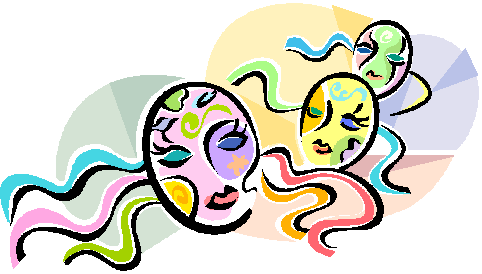How We Become Who We Are Not
Article explores how we strive for wealth, power and struggle with issues inflicted upon us by our parents and how that leads to stress and a feeling of insuffiency.

We are not born, in essence, American, French, Japanese, Christian, Muslim, or Jew. These labels are attached to us according to where on the planet our births happen to take place, or these labels are imposed upon us because they indicate our families' belief systems.
We are not born with an innate sense of distrust of others. We do not enter life with the belief that God is external to us, watching us, judging us, loving us, or simply being indifferent to our plight. We do not suckle at the breast with shame about our bodies or with racial prejudice already brewing in our hearts. We do not emerge from our mothers' wombs believing that competition and domination are essential to survival. Nor are we born believing that somehow we must validate whatever our parents consider to be right and true.
How do children come to believe that they are indispensable to their parents' well-being, and that they therefore must become the champions of their parents' unfulfilled dreams, fulfilling them by becoming the good daughter or the responsible son? How many people revolt against their parents' relationships by condemning themselves to lives of cynicism about the possibility for real love? In how many ways will members of one generation after another efface their own true natures in order to be loved, successful, approved of, powerful, and safe, not because of who they are in essence, but because they have adapted themselves to others? And how many will become part of the detritus of the cultural norm, living in poverty, disenfranchisement, or alienation?
continue story below
We are not born anxious for our survival. How is it, then, that pure ambition and the accumulation of wealth and power are ideals in our culture, when to live for them is all too often a soulless pursuit that condemns one to a path of unending stress, which fails to address or heal the core, unconscious feeling of insufficiency?
All such internalized attitudes and belief systems have been cultivated in us. Others have modeled them for us and trained us in them. This indoctrination takes place both directly and indirectly. In our homes, schools, and religious institutions, we are explicitly told who we are, what life is about, and how we should perform. Indirect indoctrination occurs as we absorb subconsciously whatever is consistently emphasized or demonstrated by our parents and other caregivers when we are very young.
As children we are like fine crystal glasses that vibrate to a singer's voice. We resonate with the emotional energy that surrounds us, unable to be sure what part is us -- our own true feelings and likes or dislikes -- and what part is others. We are keen observers of our parents' and other adults' behavior toward us and toward each other. We experience how they communicate through their facial expressions, body language, tone of voice, actions, and so on, and we can recognize -- though not consciously when we are young -- when their expressions and their feelings are congruent or not. We are immediate barometers for emotional hypocrisy. When our parents are saying or doing one thing, but we perceive that they mean something else, it confuses and distresses us. Over time these emotional "disconnects" continue to threaten our developing sense of self, and we begin to devise our own strategies for psychological security in attempts to protect ourselves.
None of this is accompanied by our conscious understanding of what we are doing, but we quickly deduce what our parents value and what evokes their approval or disapproval. We readily learn which of our own behaviors they respond to in ways that make us feel loved or unloved, worthy or unworthy. We begin to adapt ourselves by acquiescence, rebellion, or withdrawal.
As children we do not initially approach our worlds with our parents' biases and prejudices about what is good or bad. We express our true selves spontaneously and naturally. But early on, this expression begins to collide with what our parents encourage or discourage in our self-expression. All of us become conscious of our earliest sense of self in the context of their fears, hopes, wounds, beliefs, resentments, and control issues and of their ways of nurturing, whether loving, suffocating, or neglecting. This mostly unconscious socializing process is as old as human history. When we are children and our parents view us through the lens of their own adaptations to life, we as unique individuals remain more or less invisible to them. We learn to become whatever helps make us visible to them, to be whatever brings us the most comfort and least discomfort. We adapt and survive as best we can in this emotional climate.
Our strategic response results in the formation of a survival personality that does not express much of our individual essence. We falsify who we are in order to maintain some level of connection to those whom we require in order to meet our needs for attention, nurturance, approval, and security.
Children are marvels of adaptation. They quickly learn that, if acquiescence produces the best response, then being supportive and agreeable provides the best chance for emotional survival. They grow up to be pleasers, excellent providers for the needs of others, and they see their loyalty as a virtue more important than their own needs. If rebellion seems to be the best path to diminishing discomfort while also gaining attention, then they become combative and build their identities by pushing their parents away. Their fight for autonomy may later make them nonconformists unable to accept the authority of others, or they may require conflict in order to feel alive. If withdrawal works best, then children become more introverted and escape into imaginary worlds. Later in life, this survival adaptation may cause them to live so deeply in their own beliefs that they are unable to make space for others to know them or to emotionally touch them.
Because survival is at the root of the false self, fear is its true god. And because in the Now we cannot be in control of our situations, only in relationship with it, the survival personality is poorly suited to the Now. It tries to create the life it believes it should be living and, in so doing, does not fully experience the life it is living. Our survival personalities have identities to maintain that are rooted in the early childhood escape from threat. This threat comes from the disjunction between how we experience ourselves as children and what we learn to be, in response to our parents' mirroring and expectations.
Infancy and early childhood are governed by two primary drives: The first is the necessity to bond with our mothers or other important caregivers. The second is the drive to explore, to learn about and discover our worlds.
The physical and emotional bond between mother and baby is necessary not only for the child's survival but also because the mother is the first cultivator of the baby's sense of self. She cultivates it by how she holds and caresses her baby; by her tone of voice, her gaze, and her anxiety or calmness; and by how she reinforces or squelches her child's spontaneity. When the overall quality of her attention is loving, calm, supportive, and respectful, the baby knows that it is safe and all right in itself. As the child gets older, more of his or her true self emerges as the mother continues to express approval and set necessary boundaries without shaming or threatening the child. In this way her positive mirroring cultivates the child's essence and helps her child to trust itself.
In contrast, when a mother is frequently impatient, hurried, distracted, or even resentful of her child, the bonding process is more tentative and the child feels unsafe. When a mother's tone of voice is cold or harsh, her touch brusque, insensitive, or uncertain; when she is unresponsive to her child's needs or cries or cannot set aside her own psychology to make enough space for the child's unique personality, this is interpreted by the child as meaning that something must be wrong with him or her. Even when neglect is unintentional, as when a mother's own exhaustion prevents her from nurturing as well as she would like to, this unfortunate situation can still cause a child to feel unloved. As a result of any of these actions, children can begin to internalize a sense of their own insufficiency.
continue story below
Until recently, when many women have become working mothers, fathers have tended to transmit to us our sense of the world beyond the home. We wondered where Daddy was all day. We noticed whether he returned home tired, angry, and depressed or satisfied and enthusiastic. We absorbed his tone of voice as he spoke about his day; we felt the outside world through his energy, his complaints, worries, anger, or enthusiasm. Slowly we internalized his spoken or other representations of the world into which he so frequently disappeared, and all too often this world appeared to be threatening, unfair, "a jungle." If this impression of potential danger from the outside world combines with an emerging sense of being wrong and insufficient, then the child's core identity -- his or her earliest relationship to the self -- becomes one of fearfulness and distrust. As gender roles are changing, both men and working mothers perform aspects of the fathering function for their children, and some men perform aspects of mothering. We could say that in a psychological sense mothering cultivates our earliest sense of self, and how we mother ourselves throughout life strongly influences how we hold ourselves when faced with emotional pain. Fathering, on the other hand, has to do with our vision of the world and how empowered we believe ourselves to be as we implement our own personal visions in the world.
Day by day throughout childhood, we explore our worlds. As we move out into our environment, our parents' capacity to support our process of discovery and to mirror our attempts in ways that are neither overprotective nor neglectful depends on their own consciousness. Are they proud of us as we are? Or do they reserve their pride for the things we do that fit their image for us or that make them look like good parents? Do they encourage our own assertiveness, or interpret it as disobedience and quell it? When a parent delivers reprimands in a way that shames the child -- as so many generations of generally male authorities have recommended doing -- a confused and disturbed inner reality is generated in that child. No child can separate the frightful bodily intensity of shame from his or her own sense of self. So the child feels wrong, unlovable, or deficient. Even when parents have the best intentions, they frequently meet their child's tentative steps into the world with responses that seem anxious, critical, or punitive. More important, those responses are often perceived by the child as implicitly distrustful of who he or she is.
As children, we cannot differentiate our parents' psychological limitations from the effects they cause in us. We cannot protect ourselves by means of self-reflection so that we can arrive at compassion and understanding for them and ourselves, because we do not yet have the awareness to do so. We cannot know that our frustration, insecurity, anger, shame, neediness, and fear are just feelings, not the totality of our beings. Feelings seem simply good or bad to us, and we want more of the former and less of the latter. So gradually, within the context of our early environment, we wake up to our first conscious sense of self as if materializing out of a void, and without understanding the origins of our own confusion and insecurity about ourselves.
Each of us, in a certain sense, develops our earliest understanding of who we are within the emotional and psychological "fields" of our parents, much as iron filings on a sheet of paper become aligned in a pattern determined by a magnet underneath it. Some of our essence remains intact, but much of it has to be forfeited in order to ensure that, as we express ourselves and venture out to discover our worlds, we don't antagonize our parents and risk the loss of essential bonding. Our childhoods are like the proverbial Procrustean bed. We "lie down" in our parents' sense of reality, and if we are too "short" -- that is, too fearful, too needy, too weak, not smart enough, and so on, by their standards -- they "stretch" us. It can happen in a hundred ways. They might order us to stop crying or shame us by telling us to grow up. Alternatively, they might try to encourage us to stop crying by telling us everything is all right and how wonderful we are, which still indirectly suggests that how we are feeling is wrong. Of course, we also "stretch" ourselves -- by trying to meet their standards in order to maintain their love and approval. If, on the other hand, we are too "tall" -- that is, too assertive, too involved in our own interests, too curious, too boisterous, and so on -- they "shorten" us, using much the same tactics: criticism, scolding, shame, or warnings about problems we will have later in life. Even in the most loving families, in which parents have only the best intentions, a child may lose a significant measure of his or her innate spontaneous and authentic nature without either the parent or the child realizing what has happened.
As a result of these circumstances, an environment of angst is unconsciously born within us, and, at the same time, we begin a lifetime of ambivalence about intimacy with others. This ambivalence is an internalized insecurity that can leave us forever dreading both the loss of intimacy that we fear would surely occur if we somehow dared to be authentic, and the suffocating sense of being dispossessed of our innate character and natural self-expression if we were to allow intimacy.
As children we begin to create a submerged reservoir of unacknowledged, nonintegrated feelings that pollute our earliest sense of who we are, feelings like being insufficient, unlovable, or unworthy. To compensate for these, we build up a coping strategy called, in psychoanalytic theory, the idealized self. It is the self we imagine we should be or can be. We soon start to believe we are this idealized self, and we compulsively continue to attempt to be it, while avoiding anything that brings us face to face with the distressing feelings we have buried.
Sooner or later, however, these buried and rejected feelings resurface, usually in the relationships that seem to promise the intimacy we so desperately crave. But while these close relationships initially offer great promise, eventually they also expose our insecurities and fears. Since we all carry the imprint of childhood wounding to some degree, and therefore bring a false, idealized self into the space of our relationships, we are not starting from our true selves. Inevitably, any close relationship we create will begin to unearth and amplify the very feelings that we, as children, managed to bury and temporarily escape.
Our parents' ability to support and encourage the expression of our true selves depends on how much of their attention comes to us from a place of authentic presence. When parents unconsciously live from their false and idealized senses of self, they cannot recognize that they are projecting their unexamined expectations for themselves onto their children. As a result, they cannot appreciate the spontaneous and authentic nature of a young child and allow it to remain intact. When parents inevitably become uncomfortable with their children because of the parents' own limitations, they attempt to change their children instead of themselves. Without recognizing what is happening, they provide a reality for their children that is hospitable to the children's essence only to the extent that the parents have been able to discover a home in themselves for their own essence.
continue story below
All of the above may help to explain why so many marriages fail and why much that is written about relationships in popular culture is idealized. As long as we protect our idealized selves, we are going to have to keep imagining ideal relationships. I doubt they exist. But what does exist is the possibility to start from whom we really are and to invite mature connections that bring us closer to psychological healing and true wholeness.
Copyright © 2007 Richard Moss, MD
About the author:
Richard Moss, MD, is an internationally respected teacher, visionary thinker, and author of five seminal books on transformation, self-healing, and the importance of living consciously. For thirty years he has guided people from diverse backgrounds and disciplines in the use of the power of awareness to realize their intrinsic wholeness and reclaim the wisdom of their true selves. He teaches a practical philosophy of consciousness that models how to integrate spiritual practice and psychological self-inquiry into a concrete and fundamental transformation of people's lives. Richard lives in Ojai, California, with his wife, Ariel.
For a calendar of future seminars and talks by the author, and for further information on CDs and other available material, please visit www.richardmoss.com.
Or contact Richard Moss Seminars:
Office: 805-640-0632
Fax: 805-640-0849
Email: 2miracle@sbcglobal.net
next: Articles: When Ordinary People Achieve Extraordinary Things
APA Reference
Staff, H.
(2008, December 10). How We Become Who We Are Not, HealthyPlace. Retrieved
on 2026, March 5 from https://www.healthyplace.com/alternative-mental-health/sageplace/how-we-become-who-we-are-not

